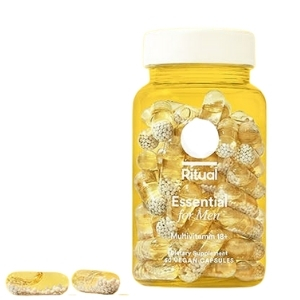 Expert's opinion
Expert's opinion
The article is a subjective view on this topic written by writers specializing in medical writing.
It may reflect on a personal journey surrounding struggles with an illness or medical condition, involve product comparisons, diet considerations, or other health-related opinions.
Although the view is entirely that of the writer, it is based on academic experiences and scientific research they have conducted; it is fact-checked by a team of degreed medical experts, and validated by sources attached to the article.
The numbers in parenthesis (1,2,3) will take you to clickable links to related scientific papers.
Best Multivitamin For Men Over 60: Top 5 Brand Reviews 2024
All articles are produced independently. When you click our links for purchasing products, we earn an affiliate commission. Learn more about how we earn revenue by reading our advertise disclaimer.

Ritual Essential for Men
- All-natural ingredients without any artificial fillers
- Delayed-release designed to dissolve in the small intestine for ideal absorption
- Gluten-free, vegan, non-GMO
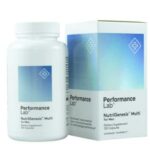
Performance Lab NutriGenesis Multi for Men
- 17+ vitamins and minerals
- Whole-food cofactors for optimal absorption
- Non-GMO, caffeine-free, soy-free, vegan, synthetic additive-free
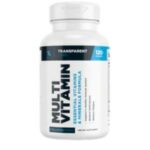
Transparent Labs Wellnessseries Multivitamin
- Non-GMO, free from artificial sweeteners, colorings, or preservatives
- Affordable
- Can also be beneficial to women
As we age, our bodies have a harder time absorbing essential nutrients from food alone. This is why supplementing with high-quality, bioavailable ingredients becomes extremely important, providing high concentrations of powerful vitamins and minerals, helping your body stay healthy and thriving.
Multivitamins usually contain a great variety of essential nutrients that work in synergy to help optimize all functions in your body[1], supporting your immune system, improving digestion, preventing infections and diseases, fighting inflammation, balancing out hormones, increasing energy levels, and improving your mood, enhancing sleep, and feeling better overall.
Best Multivitamin For Men Over 60 on the market in (April. 2024)
- Ritual Essential for Men – Editor’s choice
- Performance Lab NutriGenesis Multi for Men – Best Combination of Nutrients
- Transparent Labs Wellnessseries Multivitamin – Best for Active Men
- 1MD Prostate MD – Best for Prostate Health
- Performance Lab Flex – Best for Joints
Why Should Seniors Take Multivitamins?
It seems that 68% of Americans[2] aged 60 and older take vitamin supplements, and a study from 2017[3] found that 29% of seniors take four or more dietary supplements. If you ask any of them why they’re taking them, they’ll tell you that they want to stay healthy and prevent diseases.
And even though there is very little scientific proof behind them actually making a huge impact, they can still be helpful, especially for those who have absorption problems or who can’t plan for a diet rich in a variety of vegetables and fruit.
5 Best Multivitamin For Men Over 60 in 2024
Ritual Essential for Men
Ritual takes the pressure off choosing your multivitamin. Their Men’s over 50 formula is carefully curated, tackling all of your most essential needs with 10 potent ingredients meant to fill all the nutritional gaps in your diet.
- All-natural ingredients without any artificial fillers
- Delayed-release designed to dissolve in the small intestine for ideal absorption
- Gluten-free, vegan, made with non-genetically modified organisms (GMO) product ingredients
- High price
Ritual’s Essential Multivitamins for Men over 50 is scientifically developed to help seniors reach the micronutrient needs they’re lacking from diet alone. Their non-GMO, vegan, and gluten-free, all-natural formula is created for even the most sensitive digestive systems, using a delayed-release design for later absorption.
It’s comprised of 10 traceable ingredients, vegan omega-3, vitamins A, D, K2, E, and B12, zinc, magnesium, folate, and boron, without any artificial fillers, additives, binders, or emulsifiers. The multivitamin’s role is to help support key functions within the body, such as cardiovascular health, muscle function, and immune support. They also help your body absorb calcium, protecting your bones and preventing osteoporosis and other bone-related diseases.
Performance Lab NutriGenesis Multi for Men
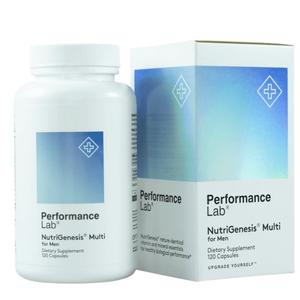
If you’re looking for a high-quality multivitamin with probiotics, prebiotics, antioxidants, and enzymes that support absorption, Performance Lab NutriGenesis Multi for Men is definitely the right choice.
- 17+ vitamins and minerals
- Whole-food cofactors for optimal absorption
- Non-GMO, caffeine-free, soy-free, vegan, synthetic additive-free
- 4-6 pills in one serving
- Higher price point
Performance Lab is a well-known supplement brand with a variety of high-quality products. Their Nutrigenesis Multi for Men is very popular amongst seniors and it’s one of the all-in-one dietary supplements that’s easy to make a part of your routine.
Their incredibly powerful formula consists of 17+ vitamins and minerals, probiotics, prebiotics, enzymes, and antioxidants for enhanced bioavailability, absorption, and digestion. The main ingredients are Vitamins A, C, D, E, K1 and K2, B1, B2, B12, calcium, iron, magnesium, boron, potassium, selenium, copper, and others.
This potent multivitamin is non-GMO, caffeine-free, soy-free, vegan, and made without any artificial fillers, colorings, binders, emulsifiers, or synthetic additives. Performance Lab’s NutriGenesis® technology helps restore missing nutrients while supporting healthy cell performance across all body systems. It does so by bioengineering vitamins and minerals with cofactors that boost absorption and maximize health benefits.
It promotes heart health, bone health, immune function, hormone balance, brain health, joint health, and so much more.
1MD Prostate MD
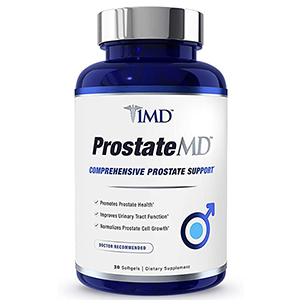
1MD Prostate MD is a blend of 11 ingredients that support urinary tract function, control prostate cell growth, and reduces frequent urges to urinate.
- Contains clinically proven USPlus® Saw Palmetto
- Doctor-formulated
- All-natural ingredients
- High price
- Some people report having trouble swallowing the large pill
Prostate health is one of the main concerns of aging men, as its function starts to diminish. 1MD Prostate MD is a powerful supplement created to improve and support the health of your prostate. It contains patented USPlus®, a saw palmetto extract containing noticeably more beta-carotene, lutein, and zeaxanthin than typical saw palmetto extracts.
Furthermore, it’s the only saw palmetto extract in the United States to receive verified certification from US Pharmacopeia (USP) and Consumer Labs. This proves its extremely high quality and potency, making it possibly one of the best herbal extracts to promote prostate health, improve bladder control, and support urinary tract health on the market.
Additionally, it contains a unique blend of bioavailable plant sterols, essential antioxidants, and essential minerals, aiming to support urinary tract function, promotes prostate cell growth, and help reduce frequent urges to urinate. The formula is recommended by urologists nationwide, standing behind its ingredients and quality. Some of the other ingredients worth mentioning are pumpkin seed oil, pygeum, and pine bark extract.
Transparent Labs Wellness series Multivitamin
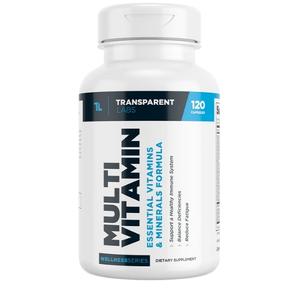
This is the perfect multivitamin for active men and women who need to replenish their micronutrient stores. It consists of 22 ultra-strong ingredients that yield powerful results, supporting your wellness from the ground up.
- Non-GMO, free from artificial sweeteners, colorings, or preservatives
- Affordable
- Can also be beneficial to women
- Not third-party tested
- 4 capsules per day
Transparent Labs Wellnessseries Multivitamin is an ultra-potent blend of 22 micronutrients in their bioavailable form that increases their absorption. Chromax® chromium picolinate, magnesium bisglycinate, copper chelate, KSM-66® organic ashwagandha root extract, N-acetylcysteine (NAC), CoQ10, and boron citrate are just some of the highlights of this incredibly potent formula, all working together to support your general wellness from top to bottom.
This multivitamin also contains the full range of B complex vitamins, helping your body convert proteins, fats, and carbohydrates into energy, optimizing your metabolism in every sense of the way. In addition, every ingredient is non-GMO and gluten-free, and the blend contains no artificial sweeteners, colorings, or preservatives.
Performance Lab Flex
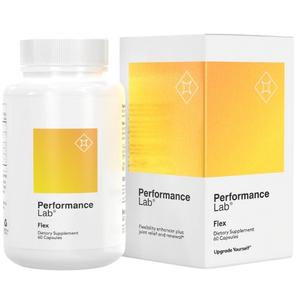
Aging puts a serious strain on the joints and getting the support it needs is often crucial. Performance Lab Flex contains a unique, high-quality blend of ingredients designed to soothe, nourish, lubricate, and protect your joints.
- Specially designed capsules that are easier to swallow
- non-GMO, vegan-friendly, soy-free, free of synthetic ingredients
- Easy on the stomach
- Price point
- May take a long time to see positive results
Performance Lab Flex is a powerful formula of active botanicals to support the health of your joints. It contains a special form of curcumin, CurcuWIN® Turmeric, that’s bioavailable and better absorbed by the body, AprèsFlex® Boswelia serrata, glucosamine, chondroitin, MSM (Methylsulfonylmethane), and strontium.
Together, they work in sync to protect the joints and connective tissues from destructive free radicals, as well as promote faster, longer-lasting joint relief[4] in those struggling with arthritis and other joint pains. Additionally, their 00-sized capsules are prebiotic-infused and made of pullulan (fermented tapioca). This makes it clean, easy to swallow, and light on the stomach.
Benefits of Multivitamins For Seniors
Taking a multivitamin is meant to fill out those nutritional gaps many seniors struggle with through their diet. Even though they should be able to get everything they need just by focusing on improving their diet, many have issues with a reduced appetite[5] and the inability to digest[6] high-fiber, vitamin-rich foods.
Multivitamins help nourish the body from the inside out, improving the function of all systems, controlling inflammation and blood pressure levels, balancing out hormones and blood sugar levels, increasing energy and improving your mood, and with it, improving overall health and wellbeing. In addition, taking a multivitamin is a good way to promote heart health by preventing nutritional deficiencies and adding certain nutrients that may be missing from your healthy diet.
Multivitamins alone can’t do the trick. You still need to improve your overall lifestyle routines and habits.
- Clean up your diet and include more plant-based foods you can tolerate and digest, focusing on variety and quality over quantity. Avoid ultra-processed foods and sugary drinks as they’re only bound to inflame your body and make it harder to flush out toxins.
- Focus on getting enough high-quality sleep throughout the night and avoid blue screens before bedtime
- Stay mobile and increase your activity level to a healthy degree, not overdoing it.
- Manage your stress levels to decrease the risk of a heart attack or stroke.
- Avoid caffeine and alcohol
Essential Multivitamins For Men Over 60
Some of the best micronutrients men over 60 should be taking include:
B Complex Vitamins
They help convert the food you eat into energy, optimizing your metabolism and increasing absorption. They’re also extremely important for nerve and brain function[7], improving connections and protecting against free radicals. B vitamins[8], particularly folic acid, support heart health.
Vitamin C
Vitamin C plays a key role in eye health, immune system health, and metabolism. It’s a powerful physiological antioxidant[9] and has been shown to regenerate other antioxidants within the body (such as vitamin E). Additionally, the American Optometric Association[10] states how vitamin C may help prevent cataracts and decrease vision loss associated with age-related macular degeneration. Recommended amounts[11] for those over 19 years of age are 90 mg for men and 75 mg for women, although these amounts might differ depending on your activity levels and lifestyle habits such as smoking cigarettes.
Vitamin D
Although most people would benefit from taking a vitamin D supplement, seniors do need more of it. Vitamin D is crucial for bone health and supporting a healthy immune system, but studies show[12] it may also help prevent osteoporosis, Alzheimer’s disease, cardiovascular disease, and type 2 diabetes. The current recommendation[13] for those over 60 years of age is 15mcg (600 IU) and for those over 70, 20 mcg (800 IU).
Calcium
Calcium deficiencies[14] are very common in aging adults, and the AARP[15] (American Association of Retired Persons) recommends taking a calcium supplement when you turn 50. It prevents brittle bones, the onset of osteoporosis, and other bone diseases. The current recommendation[16] for those over 50 is 1000 mg, and for those over 70, 1200 mg.
Omega-3 Fatty Acids
Research shows[17] how docosahexaenoic acid (DHA) may help with cognitive disorders and brain health, improve blood flow, promote the growth of brain cells, improve mood and even enhance memory. Even though it’s most easily obtained from fatty fish such as salmon, sardines, and mackerel, many seniors have issues digesting them, making supplementation crucial since we must get these fats from our diets.
Probiotics
Even though they’re not actually vitamins, probiotics[18] are another important supplement everyone should be taking, especially with age. They ensure you’re feeding your microbiome with good bacteria, helping balance out the bad, improving your digestion, and increasing the absorption of all the other vitamins and minerals you’re taking in your supplements.
Vitamin E
Some studies show[19] that supplementation with vitamin E could be beneficial to seniors as it helps improve their immune system function, helping them fight disease and even cancer. Recommended amounts[20] for those 15 years of age and over are 15 mg.
Ingredients Men Over 60 Should Avoid
Even when taking a dietary supplement, people should still pay attention to their diet and include more vitamin and mineral-rich foods, such as green leafy vegetables, healthy fats, and whole grains. That being said, there are some other ingredients men over 60 would be better off without. These include
- Ultra-processed foods[21]
- Sugars
- Artificial sweeteners
- Processed oils
- Trans fats
- Saturated fats
- Caffeine
- Alcohol
- High amounts of red meat
- Cured meat
All of these ingredients have one thing in common: inflammation. Not only will they wreak havoc in your system, but they can also clog your arteries, cause indigestion and heartburn, overstimulate your insulin[22], mess up your hormones, and impair the function of your immune system.
None of these foods are good for anyone, regardless of their age. But, as we age, our bodies start having a harder time fighting inflammatory factors and protecting themselves against disease. That’s why avoiding these ingredients is even more important after crossing that 60-year line.
How To Choose The Best Multivitamins?
When choosing the best vitamin, these are the things to look for:
- Quality ingredients – always look where they’re coming from and whether they could be third-party-tested for potency and purity.
- Scientific evidence – choose brands that have scientifically proven ingredients that work in your older age.
- Purity – avoid brands with synthetic ingredients, colorings, fillers, binders, or additives.
- Non-GMO- always choose non-GMO products
- Suitable for your diet preferences – if you’re following a vegan diet, make sure the brand of multivitamins you’re taking is vegan friendly. The same goes for gluten-free, soy-free, kosher, paleo, and others.
Final Thought
Generally, it’s believed that most seniors can obtain all of the essential nutrients from food. Still, that rarely proves to be the case. Most people start having issues with their appetite, digestion, hormones, and other health problems that make it impossible for them to keep the varied diet that their bodies need to get all the necessary vitamins and minerals. That’s why multivitamin supplements are the best thing for their overall health and longevity, protecting their body and mind from potential deficiencies that may lead to an undesirable health condition.
Frequently Asked Questions
Yes, as long as you keep taking the recommended dose and don’t go overboard.
A 60-year-old man should be taking approximately 2.4 mcg of B12. However, every person is different, and you might need a larger dose, so have a healthcare professional perform a blood test and check your levels of B12.
When it comes to aging, some of the best vitamins and minerals include B vitamins, omega-3 fatty acids, calcium, Vitamin D, and Vitamin C.
Supplements are never mandatory, and they’re never meant to replace real, whole foods. Still, as they age, many people start developing digestive issues and feelings of a reduced appetite, making it hard to obtain all the essential nutrients. That’s why a multivitamin supplement is a good recommendation, helping replenish necessary nutrients to optimize their entire system.
Yes, performing a test to check your micronutrient levels is always beneficial as it will tell you exactly which vitamins and minerals you’re deficient in and how much. Taking a generic brand is ok if this isn’t an option, but knowing your exact numbers is always better since you’re able to reach your optimal levels.
+ 22 sources
Health Canal avoids using tertiary references. We have strict sourcing guidelines and rely on peer-reviewed studies, academic researches from medical associations and institutions. To ensure the accuracy of articles in Health Canal, you can read more about the editorial process here
- El-Kadiki, A. and Sutton, A.J. (2005). Role of multivitamins and mineral supplements in preventing infections in elderly people: systematic review and meta-analysis of randomised controlled trials. BMJ, [online] 330(7496), p.871. Available at: https://www.ncbi.nlm.nih.gov/labs/pmc/articles/PMC556155/
- Inc, G. (2013). Half of Americans Take Vitamins Regularly. [online] Gallup.com. Available at: https://news.gallup.com/poll/166541/half-americans-vitamins-regularly.aspx.
- Gahche, J.J., Bailey, R.L., Potischman, N. and Dwyer, J.T. (2017). Dietary Supplement Use Was Very High among Older Adults in the United States in 2011–2014. The Journal of Nutrition, [online] 147(10), pp.1968–1976. Available at: https://academic.oup.com/jn/article/147/10/1968/4728184?login=true
- Siddiqui, M.Z. (2011). Boswellia serrata, a potential antiinflammatory agent: an overview. Indian journal of pharmaceutical sciences, [online] 73(3), pp.255–61. Available at: https://www.ncbi.nlm.nih.gov/labs/pmc/articles/PMC3309643/
- Pilgrim, A.L., Robinson, S.M., Sayer, A.A. and Roberts, H.C. (2015). An overview of appetite decline in older people. Nursing Older People, [online] 27(5), pp.29–35. Available at: https://www.ncbi.nlm.nih.gov/labs/pmc/articles/PMC4589891/#:~:text=The%20physiological%20changes%20that%20occur,can%20contribute%20to%20declining%20appetite.
- Digestive Health Team (2018). Why Does Heartburn Get Worse as You Age? [online] Cleveland Clinic. Available at: https://health.clevelandclinic.org/why-does-heartburn-get-worse-as-you-age/
- Kennedy, D. (2016). B Vitamins and the Brain: Mechanisms, Dose and Efficacy—A Review. Nutrients, [online] 8(2), p.68. Available at: https://www.ncbi.nlm.nih.gov/labs/pmc/articles/PMC4772032/
- Critical Reviews in Food Science and Nutrition. (2021). The role of B vitamins in stroke prevention. [online] Available at: https://www.tandfonline.com/doi/abs/10.1080/10408398.2021.1885341
- Frei, B., England, L. and Ames, B.N. (1989). Ascorbate is an outstanding antioxidant in human blood plasma. Proceedings of the National Academy of Sciences, [online] 86(16), pp.6377–6381. Available at: https://pubmed.ncbi.nlm.nih.gov/2762330/
- Aoa.org. (2022). Diet and Nutrition. [online] Available at: https://www.aoa.org/healthy-eyes/caring-for-your-eyes/diet-and-nutrition?sso=y#:~:text=Scientific%20evidence%20suggests%20vitamin%20C,degeneration%20and%20visual%20acuity%20loss.
- National Institutes of Health (2021). Office of Dietary Supplements – Vitamin C. [online] Nih.gov. Available at: https://ods.od.nih.gov/factsheets/VitaminC-HealthProfessional/.
- Meehan, M. and Penckofer, S. (2014). The Role of Vitamin D in the Aging Adult. Journal of Aging and Gerontology, [online] 2(2), pp.60–71. Available at: https://www.ncbi.nlm.nih.gov/labs/pmc/articles/PMC4399494/
- National Institutes of Health (2017). Vitamin D. [online] Nih.gov. Available at: https://ods.od.nih.gov/factsheets/VitaminD-HealthProfessional/.
- Beto, J.A. (2015). The Role of Calcium in Human Aging. Clinical Nutrition Research, [online] 4(1), p.1. Available at: https://www.ncbi.nlm.nih.gov/labs/pmc/articles/PMC4337919/
- Paturel, A. (2015). Supplements, Vitamins to Take in Your 50s, 60s and 70s – AARP Ever… [online] AARP. Available at: https://www.aarp.org/health/drugs-supplements/info-2015/must-have-supplements.html
- Mayo Clinic. (2022). Are you getting enough calcium? [online] Available at: https://www.mayoclinic.org/healthy-lifestyle/nutrition-and-healthy-eating/in-depth/calcium-supplements/art-20047097#:~:text=How%20much%20calcium%20you%20need%20depends%20on%20your%20age%20and%20sex.&text=The%20recommended%20upper%20limit%20for,is%202%2C000%20mg%20a%20day.
- ScienceDaily. (2022). DHA improves memory and cognitive function in older adults, study suggests. [online] Available at: https://www.sciencedaily.com/releases/2010/11/101108151346.htm#:~:text=The%20study%20found%20that%20DHA,consumers%20concerned%20about%20maintaining%20memory.
- Kingsland, J. (2022). Gut microbiome may hold key to combat muscle decline in aging. [online] Medicalnewstoday.com. Available at: https://www.medicalnewstoday.com/articles/gut-microbiome-may-hold-key-to-combat-muscle-decline-in-aging?gclid=CjwKCAiAg6yRBhBNEiwAeVyL0EOUEHShZ57OJ-OwHCMh-IEu5P3RzC0njqvAOUfiTb1uQsSLHZYmNRoCSUYQAvD_BwE
- Meydani, S.N., Lewis, E.D. and Wu, D. (2018). Perspective: Should Vitamin E Recommendations for Older Adults Be Increased? Advances in Nutrition, [online] 9(5), pp.533–543. Available at: https://academic.oup.com/advances/article/9/5/533/5071780
- National Institutes of Health (2017). Office of Dietary Supplements – Vitamin E. [online] Nih.gov. Available at: https://ods.od.nih.gov/factsheets/VitaminE-HealthProfessional/.
- Sandoval-Insausti, H., Blanco-Rojo, R., Graciani, A., López-García, E., Moreno-Franco, B., Laclaustra, M., Donat-Vargas, C., Ordovás, J.M., Rodríguez-Artalejo, F. and Guallar-Castillón, P. (2019). Ultra-processed Food Consumption and Incident Frailty: A Prospective Cohort Study of Older Adults. The Journals of Gerontology: Series A, [online] 75(6), pp.1126–1133. Available at: https://pubmed.ncbi.nlm.nih.gov/31132092/
- https://www.facebook.com/NIHAging (2019). Diabetes in Older People. [online] National Institute on Aging. Available at: https://www.nia.nih.gov/health/diabetes-older-people#:~:text=Diabetes%20is%20a%20serious%20disease,to%20develop%20in%20older%20adults.

